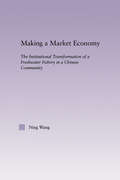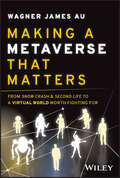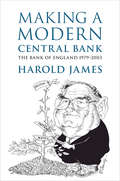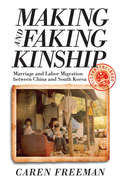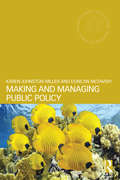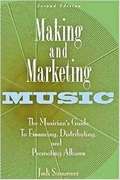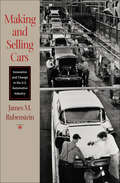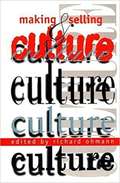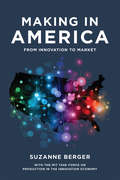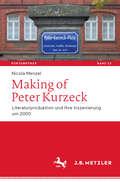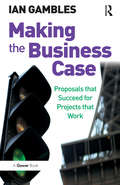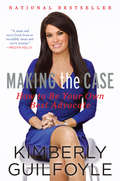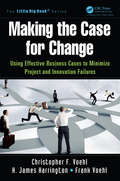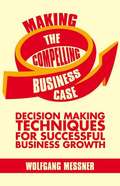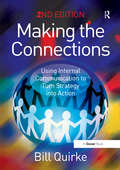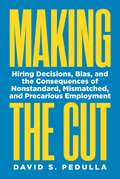- Table View
- List View
Making a Living: How to Craft Your Business
by Sophie RochesterFeaturing Tatty Devine, HemingwayDesign, Craft Scotland and moreMaking a Living has been carefully crafted to support anyone looking for practical, hands-on advice and inspiring stories to motivate them to make their dream business into a reality.Inspiring stories from jewellery makers to basket weavers, artists to terrarium makers, printmakers to ceramicists, bring bags of real-world advice and inspiration for those wanting to take their first steps into this new artisanal economy.With more time at home than ever before, the restorative distraction of crafts and making has seen a mainstream resurgence. So too has the desire to 'make a living' from creating handmade products to sell, or to sell our creative skills. This new wave of at-home entrepreneurs are using Facebook and Instagram to promote their businesses, Etsy and Not on the High Street to sell their crafts and Paypal and Shopify to manage their payments. Technology-led businesses are transforming the way in which offline maker businesses are operating - and business is booming.From the founder of Yodomo, the online learning platform for arts and crafts, and with chapters on market research, valuing and pricing your work, branding, marketing and sales, as well as accounting fundamentals and legal considerations, this is a step-by-step guide to getting your idea off the ground, either as a side hustle or as your next major career move.
Making a Market Economy: The Institutionalizational Transformation of a Freshwater Fishery in a Chinese Community (East Asia: History, Politics, Sociology and Culture)
by Ning WangFirst published in 2005. Routledge is an imprint of Taylor & Francis, an informa company.
Making a Metaverse That Matters: From Snow Crash & Second Life to A Virtual World Worth Fighting For
by Wagner James AuAn up-close account from the world’s first metaverse-embedded reporter In Making a Metaverse That Matters: From Snow Crash & Second Life to A Virtual World Worth Fighting For, the celebrated author of The Making of Second Life and Game Design Secrets, Wagner James Au, delivers an engrossing exploration of how nascent metaverse platforms have already captured the imagination of millions. Featuring powerful stories and dozens of incisive interviews with insiders including Metaverse creator Neal Stephenson himself, the author uses his unique, grassroots-level perspective as the first reporter embedded in a metaverse platform. Readers will learn about: How to understand and define the Metaverse and cut through the many myths and misconceptions around it. A behind-the-scenes account of launching Second Life, the first metaverse platform to achieve mainstream awareness, and what its many controversies teach us. Where current platforms Meta, Roblox, Fortnite, VRChat, and Lamina1, Neal Stephenson’s own metaverse startup, fit in the ecosystem. How to address the many dangers inherent in the Metaverse before it becomes central to the Internet. Perfect for XR industry members and indie creatives, Making a Metaverse That Matters is also for tech professionals, virtual world communities, and anyone interested in the future of culture and commerce.
Making a Modern Central Bank: The Bank of England 1979–2003 (Studies in Macroeconomic History)
by Harold JamesMaking a Modern Central Bank examines a revolution in monetary and economic policy. This authoritative guide explores how the Bank of England shifted its traditional mechanisms to accommodate a newly internationalized financial and economic system. The Bank's transformation into a modern inflation-targeting independent central bank allowed it to focus on a precisely defined task of monetary management, ensuring price stability. The reframing of the task of central banks, however, left them increasingly vulnerable to financial crisis. James vividly outlines and discusses significant historical developments in UK monetary policy, and his knowledge of modern European history adds rich context to archival research on the Bank of England's internal documents. A worthy continuation of the previous official histories of the Bank of England, this book also reckons with contemporary issues, shedding light on the origins of growing backlash against globalization and the European Union.
Making a New World: Founding Capitalism in the Bajío and Spanish North America
by John TutinoMaking a New World is a major rethinking of the role of the Americas in early world trade, the rise of capitalism, and the conflicts that reconfigured global power around 1800. At its center is the Bajo, a fertile basin extending across the modern-day Mexican states of Guanajuato and Quertaro, northwest of Mexico City. The Bajo became part of a new world in the 1530s, when Mesoamerican Otoms and Franciscan friars built Quertaro, a town that quickly thrived on agriculture and trade. Settlement accelerated as regional silver mines began to flourish in the 1550s. Silver tied the Bajo to Europe and China; it stimulated the development of an unprecedented commercial, patriarchal, Catholic society. A frontier extended north across vast expanses settled by people of European, Amerindian, and African ancestry. As mining, cloth making, and irrigated cultivation increased, inequities deepened and religious debates escalated. Analyzing the political economy, social relations, and cultural conflicts that animated the Bajo and Spanish North America from 1500 to 1800, John Tutino depicts an engine of global capitalism and the tensions that would lead to its collapse into revolution in 1810.
Making a Spectacle: A Fashionable History of Glasses
by Jessica GlasscockFrom 13th century Franciscan monks to Beyoncé in Black is King, Making a Spectacle charts the fascinating ascension of eyeglasses—from an unsightly but useful tool to fashion's must-have accessory.The power of glasses to convey a range of vivid messages about their wearers have made them into a billion-dollar business that appeals to cool kids and rock stars, and those who want to be like them, but the fashionable history of eyeglasses is fraught with anxiety and drama. At the beginning of the 20th century, the assessment in Vogue and Harper's Bazaar was that spectacles were "invariably disfiguring." Invisibility was the best option, and glasses were only to be put on once the lights at the opera went dark.While variations of that glasses-shaming sentiment appeared at regular intervals over the next 100 years or so, eyeglasses continued to evolve into an endless array of shapes, colors, purposes, and personalities. Once sunglasses took off in the 1930s, the magazine editorial made glasses a conspicuous part of the fashion narrative. Eyeglasses went to the ski slopes, the stables, the beach, the Havana hotel. Plastic innovations made a candy-colored rainbow of cat-eyes and "starlet" styles possible. Suddenly, everyone had the opportunity to look like Jackie O on vacation in Capri.Making a Spectacle traces contemporary high fashion frames back to their origins: the military aviator, the glam cat eye, the nerdly Oxford, the high-tech shield, the fanciful butterfly, the lowly rimless, and other styles all make an appearance. Featuring interviews with influential designers, makers, and purveyors of glasses including Adam Selman, Kerin Rose Gold, and l.a. Eyeworks, Making a Spectacle also takes a look at today's most cutting edge eyewear, showing the reader the latest and most innovative ways to see and be seen.
Making a Success of Brexit and Reforming the EU: The Brexit edition of The Trouble with Europe: 'Bootle is right on every count' - Guardian
by Roger Bootle"I recommend our diplomats and ministers read this book: it will provide them with an intellectual backbone. On the big calls [Bootle] has a spectacularly good record." Dominic Lawson, The Sunday Times "Bootle is right on every count." The Guardian HOW BREXIT WILL WORK FOR BRITAIN AND EUROPEMaking a Success of Brexit and Reforming the EU is the extensively revised and expanded new edition of the acclaimed The Trouble with Europe. Following Britain's vote to leave the EU and the ensuing uncertainty in both Europe and the UK, here, one of Britain's best known economists Roger Bootle, charts a way forward for all. For Leavers and Remainers alike, this book analyses the choices the UK faces about its relationship with the EU - and the rest of the world. It discusses the key issues concerning a 'hard' or 'soft' Brexit, Free Trade Agreements, the Single Market and the Customs Union, as well as the principles and pitfalls of the negotiating process. Meanwhile, with or without Brexit, the EU faces an existential crisis. It needs to choose between three different paths: radical reform, further integration or break-up. This book assesses the costs and benefits of each, concluding with a version of how the world would look without the EU. Bootle's exemplary outline of the origins and historical context of the EU is retained from the previous edition, where he acknowledges the remarkable achievements of the EU, before laying out the shortcomings which have led to the parting of the ways with Britain.This is the essential read as the Brexit negotiations progress.
Making and Bending International Rules: The Design of Exceptions and Escape Clauses in Trade Law
by Krzysztof J. PelcAll treaties, from human rights to international trade, include formal exceptions that allow governments to legally break the rules that they have committed to, in order to deal with unexpected events. Such institutional 'flexibility' is necessary, yet it raises a tricky theoretical question: how to allow for this necessary flexibility, while preventing its abuse? Krzysztof Pelc examines how designers of rules in vastly different settings come upon similar solutions to render treaties resistant to unexpected events. Essential for undergraduate students, graduate students, and scholars in political science, economics, and law, the book provides a comprehensive account of the politics of treaty flexibility. Drawing on a wide range of evidence, its multi-disciplinary approach addresses the paradoxes inherent in making and bending international rules.
Making and Faking Kinship: Marriage and Labor Migration between China and South Korea
by Caren FreemanIn the years leading up to and directly following rapprochement with China in 1992, the South Korean government looked to ethnic Korean (Chosǒnjok) brides and laborers from northeastern China to restore productivity to its industries and countryside. South Korean officials and the media celebrated these overtures not only as a pragmatic solution to population problems but also as a patriotic project of reuniting ethnic Koreans after nearly fifty years of Cold War separation. As Caren Freeman's fieldwork in China and South Korea shows, the attempt to bridge the geopolitical divide in the name of Korean kinship proved more difficult than any of the parties involved could have imagined. Discriminatory treatment, artificially suppressed wages, clashing gender logics, and the criminalization of so-called runaway brides and undocumented workers tarnished the myth of ethnic homogeneity and exposed the contradictions at the heart of South Korea’s transnational kin-making project. Unlike migrant brides who could acquire citizenship, migrant workers were denied the rights of long-term settlement, and stringent quotas restricted their entry. As a result, many Chosǒnjok migrants arranged paper marriages and fabricated familial ties to South Korean citizens to bypass the state apparatus of border control. Making and Faking Kinship depicts acts of "counterfeit kinship," false documents, and the leaving behind of spouses and children as strategies implemented by disenfranchised people to gain mobility within the region’s changing political economy.
Making and Managing Public Policy (Masters in Public Management)
by Karen Johnston Miller Duncan McTavishUnderstanding how public policy is made and managed is a key component in studying the disciplines of public management and administration. Such are the complexities associated with this topic, a deeper understanding is vital to ensure that practising public managers excel in their roles. This textbook synthesizes the key theories, providing a contemporary understanding of public policy and how it relates to private and other sectors. It integrates this with the management and implementation of public policy, including outlines of organizations, practices and instruments used. Pedagogical features include chapter synopses, learning objectives, boxed international cases and vignettes and further reading suggestions. This useful, concise textbook will be required reading for public management students and all those interested in public policy.
Making and Marketing Music: The Musician's Guide to Financing, Distributing, and Promoting Albums
by Jodi SummersThis industry-savvy guide will help musicians of all levels make the album that best complements their skills and meets their career objectives. Revealed here are the who, what, where, when and how of album making, and the tools to sell and prosper in the business. Included are interviews with P. Diddy, Ozzy Osbourne, and members of Linkin Park, and other top industry professionals.Allworth Press, an imprint of Skyhorse Publishing, publishes a broad range of books on the visual and performing arts, with emphasis on the business of art. Our titles cover subjects such as graphic design, theater, branding, fine art, photography, interior design, writing, acting, film, how to start careers, business and legal forms, business practices, and more. While we don't aspire to publish a New York Times bestseller or a national bestseller, we are deeply committed to quality books that help creative professionals succeed and thrive. We often publish in areas overlooked by other publishers and welcome the author whose expertise can help our audience of readers.
Making and Saving Money: Jobs, Taxes, Inflation... And Much More! (A True Book (Relaunch))
by Janet Liu Melinda LiuA series to build strong financial habits early on in life!Knowing about different jobs and how to make the most of their earnings are just two critical financial literacy skills that all kids should have. Did you know that doctors have some of the highest paying jobs in the United States? Or that just 39 percent of kids in America have a savings account? Learn all this and more in Making and Saving Money - a book that gives kids insight into how our economy works.ABOUT THE SERIES:How can I make money? What is inflation? What is the difference between a debit card and a credit card? Economics - and more specifically, money - play such a large role in our lives. Yet there are many mysteries and misconceptions surrounding the basic concepts of finance and smart money management. This set of True Books offers students the know-how they'll need to start on the road to financial literacy-a crucial skill for today's world. Interesting information is presented in a fun, friendly way-and in the simplest terms possible-which will enable students to build strong financial habits early on in life.
Making and Selling Cars: Innovation and Change in the U.S. Automotive Industry
by James M. RubensteinFrom the creation of fast food, to the design of cities, to the character of our landscape, the automobile has shaped nearly every aspect of modern American life. In fact, the U.S. motor vehicle industry is the largest manufacturing industry in the world.James Rubenstein documents the story of the automotive industry... which despite its power, is an industry constantly struggling to redefine itself and assure its success. Making and Selling Cars: Innovation and Change in the U.S. Automotive Industry shows how this industry made adjustments and fostered innovations in both production and marketing in order to remain a viable force throughout the twentieth-century.Rubenstein builds his study of the American auto industry with care, taking the reader through this quintessentially modern history of production and consumption. Avoiding jargon while never over simplifying, Rubenstein gives a detailed and straightforward account of both the production and merchandising of cars. We learn how the industry began and about its methods for building cars and the modern American marketplace. Along the way there were many missteps and challenges—the Edsel, the fuel crisis, and the ascendancy of Japanese cars in the 1980s. The industry met these types of problems with new techniques and approaches. To demonstrate this, Rubenstein gives the reader examples of how the auto industry used to work, which he alternates with chapters showing how the industry has reinvented itself. Making and Selling Cars explains why the U.S. automotive industry has been and remains a vigorous shaper of the American economy.
Making and Selling Culture
by Richard M. OhmannAn in depth look at how culture and marketing play off each other.
Making in America: From Innovation to Market
by Suzanne BergerAmerica is the world leader in innovation, but many of the innovative ideas that are hatched in American start-ups, labs, and companies end up going abroad to reach commercial scale. Apple, the superstar of innovation, locates its production in China (yet still reaps most of its profits in the United States). When innovation does not find the capital, skills, and expertise it needs to come to market in the United States, what does it mean for economic growth and job creation? Inspired by the MIT Made in America project of the 1980s, "Making in America" brings experts from across MIT to focus on a critical problem for the country. MIT scientists, engineers, social scientists, and management experts visited more than 250 firms in the United States, Germany, and China. In companies across America--from big defense contractors to small machine shops and new technology startups--these experts tried to learn how we can rebuild the industrial landscape to sustain an innovative economy. At each stop, they asked this basic question: "When you have a new idea, how do you get it into the market?" They found gaping holes and missing pieces in the industrial ecosystem. Critical strengths and capabilities that once helped bring new enterprises to life have disappeared: production capacity; small and medium-size suppliers; spillovers of research, training, and new technology from big corporations. ( "Production in the Innovation Economy," also published by the MIT Press in 2013, describes this research. )Even in an Internet-connected world, proximity to innovation and users matters for industry. "Making in America "describes ways to strengthen this connection, including public-private collaborations, new government-initiated manufacturing innovation institutes, and industry-community college projects. If we can learn from these ongoing experiments in linking innovation to production, American manufacturing could have a renaissance.
Making in America: From Innovation to Market
by Suzanne BergerHow America can rebuild its industrial landscape to sustain an innovative economy.America is the world leader in innovation, but many of the innovative ideas that are hatched in American start-ups, labs, and companies end up going abroad to reach commercial scale. Apple, the superstar of innovation, locates its production in China (yet still reaps most of its profits in the United States). When innovation does not find the capital, skills, and expertise it needs to come to market in the United States, what does it mean for economic growth and job creation? Inspired by the MIT Made in America project of the 1980s, Making in America brings experts from across MIT to focus on a critical problem for the country.MIT scientists, engineers, social scientists, and management experts visited more than 250 firms in the United States, Germany, and China. In companies across America—from big defense contractors to small machine shops and new technology start-ups—these experts tried to learn how we can rebuild the industrial landscape to sustain an innovative economy. At each stop, they asked this basic question: “When you have a new idea, how do you get it into the market?” They found gaping holes and missing pieces in the industrial ecosystem. Even in an Internet-connected world, proximity to innovation and users matters for industry. Making in America describes ways to strengthen this connection, including public-private collaborations, new government-initiated manufacturing innovation institutes, and industry/community college projects. If we can learn from these ongoing experiments in linking innovation to production, American manufacturing could have a renaissance.
Making of Peter Kurzeck: Literaturproduktion und ihre Inszenierung um 2000 (Kontemporär. Schriften zur deutschsprachigen Gegenwartsliteratur #22)
by Nicola MenzelDie Studie untersucht die öffentliche Darstellung des Schreibprozesses Peter Kurzecks. Seine mehrbändige autofiktionale Romanreihe Das alte Jahrhundert sowie seine frei eingesprochenen Hörbücher wurden im Feuilleton einhellig als außergewöhnlich besprochen. Sie gelten als authentische Rarität in einem sich ansonsten zunehmend popularisierendem Literaturbetrieb. Die Arbeit zeigt hingegen, dass das Phänomen Kurzeck keinesfalls abseits eines ökonomisierten und medialisierten gegenwartskulturellen Feldes steht. Vielmehr lassen sich typische populäre und ökonomische Mechanismen ablesen wie u.a. Mehrfachadressierung, Zweitverwertung, Serialität und Fankultur. Auch das Phänomen Kurzeck selbst wirkt auf das Feld ein, von dem es sich abzusondern scheint, und zwar nicht trotz des autonomieästhetischen Gestus, sondern gerade deswegen. Kurzeck wird mithin als gegenwartsästhetisches Phänomen untersucht, bei dem Marktdistinktion zum Verkaufsargument wird.Exemplarisch an Kurzeck wird gezeigt, dass sich Formationen des gegenwartskulturellen Feldes um 2000 auch dort ablesen lassen, wo sie nicht erwartet werden. Die Arbeit regt dazu an, einen emphatischen Literaturbegriff als grundsätzlich produzierbar und konsumierbar zu verstehen, mit Blick auf Kurzeck als werkpolitischer Effekt der Selbst- und Schreibdarstellung einer Autorfigur. Als Beitrag zur Gegenwartsliteraturforschung regt sie darüber hinaus zur Reflexion der literaturwissenschaftlichen Haltung gegenüber ihrem Gegenstand und den eigenen Forschungspraktiken an.Methodisch verbindet sie feldtheoretische Fragen mit close readings nicht nur literarischer Texte und ihrer Vorarbeiten aus dem Nachlass Kurzecks, sondern auch von Interviews, Preisreden, Videoaufnahmen von Lesungen, einem öffentlichen Manuskriptdiktat im Frankfurter Literaturhaus sowie der Peter-Kurzeck-App. Das dafür entwickelte umfassende methodische Modell stellt einen generellen Vorschlag dar zur Analyse gegenwartsliterarischer Gegenstände, bei der literaturwissenschaftliche Methoden mit ökonomischen, paratextuellen, soziologischen, praxeologischen und kulturästhetischen Aspekten im Dialog stehen.
Making stickK Stick: The Business of Behavioral Economics
by Michael Norris Michael I. Norton Leslie K. JohnstickK.com, a website that uses behavioral economics to help users achieve their goals, must choose between a direct-to-consumer or business-to-business model. The case includes a discussion of how principles of behavioral economics can be used to influence behavior, and how an understanding of behavioral economics can inform managerial decisions about product adoption and diffusion.
Making the African Continental Free Trade Agreement a Success: Pathways and a Call for Action
by Edited ByAlbert Zeufack Fulbert Tchana Tchana Aly SanohIn 2019, African heads of state and governments launched in fanfare the African Continental Free Trade Agreement (AfCFTA), a historic agreement for economic transformation across the continent. But now comes the hard bit: how to make the agreement a success?In this book, senior experts from across the world come together to provide a comprehensive analysis of the conditions needed for AfCFTA to successfully spur economic development in Africa. It puts forward three foundations for success: demography dividend, digital economy, and economic diversification. In addition to trade policy, the book recommends that African policymakers should strengthen fiscal and monetary policy coordination, adopt and implement the appropriate regulatory environment, and build suitable connectivity infrastructure. The stakes are high. If implemented correctly, the book argues that AfCFTA could speed up trade within Africa, which could double every five years. Success would mean growth, investment, changing trade patterns, jobs, economic transformation, poverty reduction, and a continental market for services.Driven by concrete, evidence-based strategies for long-term growth, this book is an essential read for policy makers, development practitioners, economics researchers, and everyone with an interest in the future of Africa.
Making the Business Case: Proposals that Succeed for Projects that Work
by Ian GamblesA good business case is so much more than simply the means to justify a decision. A well-written and well-researched business case will secure funding; make sure any project stays on the right side of regulation; mobilize support for the cause; provide the platform for managing the project and the benchmark against which to measure progress. Ian Gambles' Making the Business Case shows you how to make sense of the task at hand, develop a strategy, articulate your options, define the benefits, establish the costs, identify the risks and make a compelling case. Just as with the best business cases, the text is concise, jargon-free and easy to read; illustrated throughout with practical examples drawn from real cases and including reflective exercises at the end of each chapter to help you consolidate what you have learned. At only 198 pages long, this is a jewel of a book; essential reading for the manager tasked with making the business case, the senior manager who needs to understand and test it, and the project manager who is responsible for delivering whatever is agreed on.
Making the Case
by Kimberly GuilfoyleAfter an eleven-year-old Kimberly Guilfoyle lost her mother to leukemia, her dad wanted her to become as resilient and self-empowered as she could be. He wisely taught her to build a solid case for the things she wanted. Creating a strong logical argument was the best way to ensure she could always meet her needs. That childhood lesson led her to become the fearless advocate and quick-thinking spitfire she is today. In Making the Case, Guilfoyle interweaves stories and anecdotes from her life and career with practical advice that can help you win arguments, get what you want, help others along the way, and come out ahead in any situation.Learning how to state your case effectively is not just important for lawyers--it's something every person should know how to do, no matter what stage of life they are in. From landing her dream job right out of school, switching careers seamlessly midstream, and managing personal finances for greater growth and stability to divorcing amicably and teaching her young child to advocate for himself, Guilfoyle has been there and done it. Now she shares those stories, showing you how to organize your thoughts and plans, have meaningful discussions with the people around you, and achieve your goals in all aspects of your life. You'll also learn the tips and strategies that make the best advocates so successful, some of which come directly from courtroom scenarios where the stakes are highest.Told in her winning and humorous voice, Guilfoyle's experiences and the wisdom drawn from them are a ready guide to help you reach your potential and live a fulfilling and happy life at work and at home.
Making the Case for Change: Using Effective Business Cases to Minimize Project and Innovation Failures (The Little Big Book Series)
by H. James Harrington Frank Voehl Christopher F. VoehlThe best time to stop projects or programs that will not be successful is before they are ever started. Research has shown that the focused use of realistic business case analysis on proposed initiatives could enable your organization to reduce the amount of project waste and churn (rework) by up to 40 percent, potentially avoiding millions of doll
Making the Compelling Business Case
by Wolfgang MessnerDespite clear objectives, managers often make decisions on projects with uncertain outcomes, which can result in failed initiatives, missed goals and overrunning costs. A business case is a process, a tool and a document that builds consensus among stakeholders and gives decisionmakers the rational evidence they need to give the go-ahead. Making the Compelling Business Case shows readers how to champion new ideas and raise them to senior management; it simplifies the decision-making process by explaining the key theories and practices behind corporate investments. These methods can be applied to a variety of investment decisions, including strategic choices, capacity management, and budget allocation alternatives. This comprehensive and stimulating book features insightful case-studies and valuable hands-on tools, designed to help executives make smart decisions and to maximize enterprise value.
Making the Connections: Using Internal Communication to Turn Strategy into Action (Routledge Revivals Ser.)
by Bill QuirkeCompanies know that communication with their people is vital if the energies and the efforts of their employees are to point in the same direction. Making the Connections shows how to use internal communication to turn strategy into action. Bill Quirke demonstrates practically how businesses can use internal communication to achieve differentiation, to improve their quality, customer service, and innovation, and to manage change more effectively. He describes the why, the what and the how of internal communication - why business needs better communication to achieve its objectives, what internal communication needs to deliver to add value, and how organizations need to manage their communication for best results. This new edition contains a wealth of new material, with pragmatic advice and new case studies. Four new chapters cover how to develop internal communication strategy, global communication, engaging employees, and helping leaders communicate more effectively. Making the Connections is based on the extensive international experience of one of the most knowledgeable and leading authorities on internal communication. This thoroughly revised new edition explores the impact of new technology, regulation, globalization and the changing relationship between employer and employees on the process of internal communication.
Making the Cut: Hiring Decisions, Bias, and the Consequences of Nonstandard, Mismatched, and Precarious Employment
by David PedullaAn in-depth look at how employers today perceive and evaluate job applicants with nonstandard or precarious employment historiesMillions of workers today labor in nontraditional situations involving part-time work, temporary agency employment, and skills underutilization or face the precariousness of long-term unemployment. To date, research has largely focused on how these experiences shape workers’ well-being, rather than how hiring agents perceive and treat job applicants who have moved through these positions. Shifting the focus from workers to hiring agents, Making the Cut explores how key gatekeepers—HR managers, recruiters, and talent acquisition specialists—evaluate workers with nonstandard, mismatched, or precarious employment experience. Factoring in the social groups to which workers belong—such as their race and gender—David Pedulla shows how workers get jobs, how the hiring process unfolds, who makes the cut, and who does not.Drawing on a field experiment examining hiring decisions in four occupational groups and in-depth interviews with hiring agents in the United States, Pedulla documents and unpacks three important discoveries. Hiring professionals extract distinct meanings from different types of employment experiences; the effects of nonstandard, mismatched, and precarious employment histories for workers’ job outcomes are not all the same; and the race and gender of workers intersect with their employment histories to shape which workers get called back for jobs. Indeed, hiring professionals use group-based stereotypes to weave divergent narratives or “stratified stories” about workers with similar employment experiences. The result is a complex set of inequalities in the labor market.Looking at bias and discrimination, social exclusion in the workplace, and the changing nature of work, Making the Cut probes the hiring process and offers a clearer picture of the underpinnings of getting a job in the new economy.

